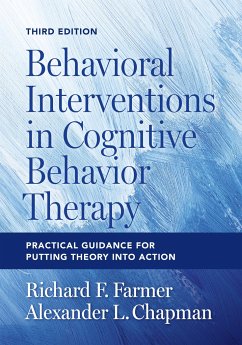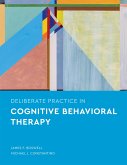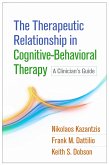Richard F. Farmer, Alexander L. Chapman
Behavioral Interventions in Cognitive Behavior Therapy
Practical Guidance for Putting Theory Into Action
Richard F. Farmer, Alexander L. Chapman
Behavioral Interventions in Cognitive Behavior Therapy
Practical Guidance for Putting Theory Into Action
- Broschiertes Buch
- Merkliste
- Auf die Merkliste
- Bewerten Bewerten
- Teilen
- Produkt teilen
- Produkterinnerung
- Produkterinnerung
An authoritative introduction to behavior therapy as well as a comprehensive resource for those with a firm background in this area.
Andere Kunden interessierten sich auch für
![Deliberate Practice in Cognitive Behavioral Therapy Deliberate Practice in Cognitive Behavioral Therapy]() James F. BoswellDeliberate Practice in Cognitive Behavioral Therapy44,99 €
James F. BoswellDeliberate Practice in Cognitive Behavioral Therapy44,99 €![Making Cognitive-Behavioral Therapy Work Making Cognitive-Behavioral Therapy Work]() Deborah Roth Ledley (United States private practice)Making Cognitive-Behavioral Therapy Work35,99 €
Deborah Roth Ledley (United States private practice)Making Cognitive-Behavioral Therapy Work35,99 €![The Therapeutic Relationship in Cognitive-Behavioral Therapy The Therapeutic Relationship in Cognitive-Behavioral Therapy]() Nikolaos Kazantzis (Australia Monash University)The Therapeutic Relationship in Cognitive-Behavioral Therapy39,99 €
Nikolaos Kazantzis (Australia Monash University)The Therapeutic Relationship in Cognitive-Behavioral Therapy39,99 €![Imagery in Cognitive-Behavioral Therapy Imagery in Cognitive-Behavioral Therapy]() Lusia Stopa (University of Southampton (Emeritus) United Kingdom )Imagery in Cognitive-Behavioral Therapy58,99 €
Lusia Stopa (University of Southampton (Emeritus) United Kingdom )Imagery in Cognitive-Behavioral Therapy58,99 €![Treatment Plans and Interventions in Couple Therapy Treatment Plans and Interventions in Couple Therapy]() Norman B. EpsteinTreatment Plans and Interventions in Couple Therapy60,99 €
Norman B. EpsteinTreatment Plans and Interventions in Couple Therapy60,99 €![Cognitive-Behavioral Therapy in Groups Cognitive-Behavioral Therapy in Groups]() Peter J. Bieling (McMaster University and St. Joseph's HealthcareCognitive-Behavioral Therapy in Groups101,99 €
Peter J. Bieling (McMaster University and St. Joseph's HealthcareCognitive-Behavioral Therapy in Groups101,99 €![Spirituality, Religion, and Cognitive-Behavioral Therapy Spirituality, Religion, and Cognitive-Behavioral Therapy]() David H. Rosmarin (McLean Hospital / United S Harvard Medical SchoolSpirituality, Religion, and Cognitive-Behavioral Therapy34,99 €
David H. Rosmarin (McLean Hospital / United S Harvard Medical SchoolSpirituality, Religion, and Cognitive-Behavioral Therapy34,99 €-
-
-
An authoritative introduction to behavior therapy as well as a comprehensive resource for those with a firm background in this area.
Produktdetails
- Produktdetails
- Verlag: American Psychological Association
- Third Edition
- Seitenzahl: 645
- Erscheinungstermin: 4. Februar 2025
- Englisch
- Abmessung: 254mm x 175mm x 36mm
- Gewicht: 1164g
- ISBN-13: 9781433841415
- ISBN-10: 143384141X
- Artikelnr.: 70771952
- Herstellerkennzeichnung
- Libri GmbH
- Europaallee 1
- 36244 Bad Hersfeld
- gpsr@libri.de
- Verlag: American Psychological Association
- Third Edition
- Seitenzahl: 645
- Erscheinungstermin: 4. Februar 2025
- Englisch
- Abmessung: 254mm x 175mm x 36mm
- Gewicht: 1164g
- ISBN-13: 9781433841415
- ISBN-10: 143384141X
- Artikelnr.: 70771952
- Herstellerkennzeichnung
- Libri GmbH
- Europaallee 1
- 36244 Bad Hersfeld
- gpsr@libri.de
Richard F. Farmer is a licensed psychologist and research scientist affiliated with Oregon Research Institute in Springfield, Oregon. After earning a doctoral degree in clinical psychology from the University of North Carolina at Greensboro following an internship at Duke University Medical Center, he served as an associate professor of psychology at Idaho State University and East Carolina University, and as a senior lecturer in psychology at the University of Canterbury in Christchurch, New Zealand. His main areas of research and clinical interest include behavioral assessment and therapy, emotional and behavioral disorders over the lifespan, personality disorders, impulsivity, and substance misuse. Alexander L. Chapman is a professor, registered psychologist, and director of clinical training in the Department of Psychology at Simon Fraser University as well as the president of the Dialectical Behaviour Therapy Centre of Vancouver. He received his BA from the University of British Columbia and his MS and PhD in clinical psychology from Idaho State University following an internship at Duke University Medical Center. Dr. Chapman completed a post-doctoral fellowship with Dr. Marsha Linehan at the University of Washington. Dr. Chapman amp rsquo s research focuses on complex mental health concerns such as borderline personality disorder.
Preface to the Third Edition
Chapter . Historical and Conceptual Overview of Behavior and Cognitive
Therapies
Part I. Conceptual Foundations of Behavioral Assessment
Chapter 2. Principles, Goals, and Structure of Initial Assessment Sessions
Chapter 3. Behavioral Case Formulation
Chapter 4. Treatment Planning and Implementation
Part II. Interventions with Broad Applicability
Chapter 5. Changing Behavior by Changing the Environment
Chapter . Altering the Context that Supports Maladaptive Thinking
Chapter 7. Developing and Strengthening New Behaviors and Skills
Chapter 8. Reducing Distress and Avoidance Through Exposure-Based
Interventions
Part III. Interventions for Promoting Change in Specific Areas
Chapter 9. Fostering Mindfulness and Acceptance
Chapter . Enhancing Emotion Regulation
Chapter . Promoting Behavioral Activation
Chapter 2. Improving Problem Solving
Chapter 3. Increasing Interpersonal Effectiveness
Chapter 4. Strengthening Self-Management Skills
Part IV. Therapy Process and Practice Considerations
Chapter 5. Guiding Ethical and Professional Considerations When Using
Behavioral Interventions
Chapter . Navigating Therapeutic Challenges
Chapter 7. Bringing Therapy to a Close and Aftercare
References
Chapter . Historical and Conceptual Overview of Behavior and Cognitive
Therapies
Part I. Conceptual Foundations of Behavioral Assessment
Chapter 2. Principles, Goals, and Structure of Initial Assessment Sessions
Chapter 3. Behavioral Case Formulation
Chapter 4. Treatment Planning and Implementation
Part II. Interventions with Broad Applicability
Chapter 5. Changing Behavior by Changing the Environment
Chapter . Altering the Context that Supports Maladaptive Thinking
Chapter 7. Developing and Strengthening New Behaviors and Skills
Chapter 8. Reducing Distress and Avoidance Through Exposure-Based
Interventions
Part III. Interventions for Promoting Change in Specific Areas
Chapter 9. Fostering Mindfulness and Acceptance
Chapter . Enhancing Emotion Regulation
Chapter . Promoting Behavioral Activation
Chapter 2. Improving Problem Solving
Chapter 3. Increasing Interpersonal Effectiveness
Chapter 4. Strengthening Self-Management Skills
Part IV. Therapy Process and Practice Considerations
Chapter 5. Guiding Ethical and Professional Considerations When Using
Behavioral Interventions
Chapter . Navigating Therapeutic Challenges
Chapter 7. Bringing Therapy to a Close and Aftercare
References
Preface to the Third Edition
Chapter . Historical and Conceptual Overview of Behavior and Cognitive
Therapies
Part I. Conceptual Foundations of Behavioral Assessment
Chapter 2. Principles, Goals, and Structure of Initial Assessment Sessions
Chapter 3. Behavioral Case Formulation
Chapter 4. Treatment Planning and Implementation
Part II. Interventions with Broad Applicability
Chapter 5. Changing Behavior by Changing the Environment
Chapter . Altering the Context that Supports Maladaptive Thinking
Chapter 7. Developing and Strengthening New Behaviors and Skills
Chapter 8. Reducing Distress and Avoidance Through Exposure-Based
Interventions
Part III. Interventions for Promoting Change in Specific Areas
Chapter 9. Fostering Mindfulness and Acceptance
Chapter . Enhancing Emotion Regulation
Chapter . Promoting Behavioral Activation
Chapter 2. Improving Problem Solving
Chapter 3. Increasing Interpersonal Effectiveness
Chapter 4. Strengthening Self-Management Skills
Part IV. Therapy Process and Practice Considerations
Chapter 5. Guiding Ethical and Professional Considerations When Using
Behavioral Interventions
Chapter . Navigating Therapeutic Challenges
Chapter 7. Bringing Therapy to a Close and Aftercare
References
Chapter . Historical and Conceptual Overview of Behavior and Cognitive
Therapies
Part I. Conceptual Foundations of Behavioral Assessment
Chapter 2. Principles, Goals, and Structure of Initial Assessment Sessions
Chapter 3. Behavioral Case Formulation
Chapter 4. Treatment Planning and Implementation
Part II. Interventions with Broad Applicability
Chapter 5. Changing Behavior by Changing the Environment
Chapter . Altering the Context that Supports Maladaptive Thinking
Chapter 7. Developing and Strengthening New Behaviors and Skills
Chapter 8. Reducing Distress and Avoidance Through Exposure-Based
Interventions
Part III. Interventions for Promoting Change in Specific Areas
Chapter 9. Fostering Mindfulness and Acceptance
Chapter . Enhancing Emotion Regulation
Chapter . Promoting Behavioral Activation
Chapter 2. Improving Problem Solving
Chapter 3. Increasing Interpersonal Effectiveness
Chapter 4. Strengthening Self-Management Skills
Part IV. Therapy Process and Practice Considerations
Chapter 5. Guiding Ethical and Professional Considerations When Using
Behavioral Interventions
Chapter . Navigating Therapeutic Challenges
Chapter 7. Bringing Therapy to a Close and Aftercare
References








